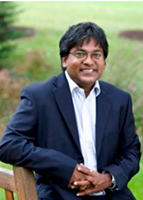报告时间: 2019年11月22日(星期五)上午10:00
报告地点: 催化基础国重楼三楼大会议室
报 告 人: Professor S. Ravi P. Silva, Advanced Technology Institute, University of Surrey

报告摘要:
At present the energy generation process worldwide is going through major change. The dominance of fossil fuel based energy generation is being challenged, and this is predominantly due to cheaper crystalline silicon solar cells coming to the market. Yet would the story end here? What will happen with the steady progress being envisaged in the organic-inorganic large area compatible plastic electronic technologies as well as the tandem silicon-perovskite era?
Within the talk novel technologies being progressed using 4G (4th Generation) solar cells that include perovskites will be discussed and show how these will all develop into a very interesting decade of technology development in flexible organic electronics as part of the energy mix. The routes for higher efficiency organic cells, while maintaining the low cost base will be discussed . The use of novel architectures and materials will include perovskites. We will focus on a solvent engineering-based approach that enables parasitic Sn4+ produced by oxidation of Sn2+ in Sn-based perovskite solar cells (PSCs) to be removed. The resulting process, motivated by work in ores and alloys, through appropriate solvent selection enables the highest grain sizes, low Urbach energies and high charge carrier mobilities, for the triple cation Pb-Sn mixed Cs0.05(FA0.83MA0.17)0.95Pb0.5Sn0.5I3 (bandgap~1.26 eV) system. The resulting PSCs enable more than 80% improvement in device efficiencies compared to other anti-solvents that extract Sn4+ less efficiently with champion efficiencies exceeding 12%. Furthermore, a route towards fill factors exceeding 80% with a best value of 83% approaching the Shockley-Queisser limit will be discussed through the incorporation of Br-. The need for flexible energy scavenging sources as well as novel energy storage ensures “energy materials” will be at the heart of any new technologies to be introduced and developed in the coming years. The current drivers for energy security and energy mix will be analysed, and question why humanity appears to be stuck on fossil fuels. In the future is it possible that the paradigm of paying for electricity can be overturned and even enter a process where we are able to give free energy by 2035? We will examine the potential of energy scavenging to supply all energy needs for society, including wearables and if this can be realised at zero cost to the consumer.
报告人简介:
Professor Ravi Silva BA MA PhD FREng CEng CPhys FIET FInstP FRSA is a Surrey Distinguished Professor and the Director of the Advanced Technology Institute (ATI) at the University of Surrey. He heads the Nano-Electronics Centre (NEC). Prof. Silva conducted his studies at Cambridge University. His research has resulted in over 600 presentations at international conferences, and over 580 archival journal papers, with a H-index of 70. He has published in Nature, Science, Nature Materials, Advanced Materials, NanoLetters, Physical Review Letters, Applied Physics Letters among the many journals. He is the inventor of 30 patents and two start-up companies. He is the 2014 winner of the J J Thomson Medal from the IET for contributions to electronics, in 2015 the winner of the Platinum Medal from the IOM3, in 2018 the winner of the James Joule Medal from the Institute of Physics and has won numerous international awards for research. He is a Fellow of the Royal Academy of Engineering and National Academy of Sciences Sri Lanka.
联系人:05T7组 唐晓璐
联系电话:82463721






